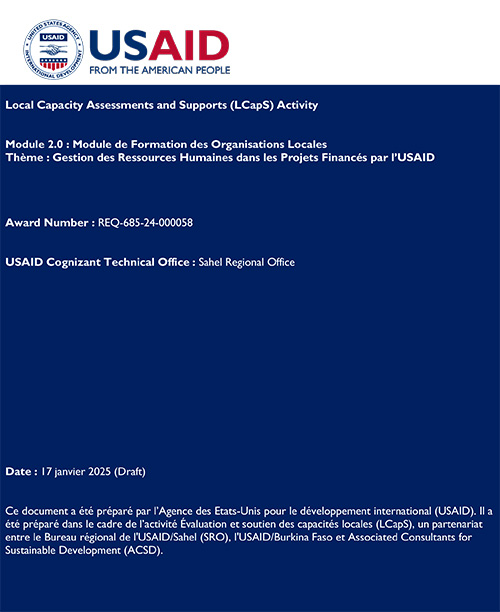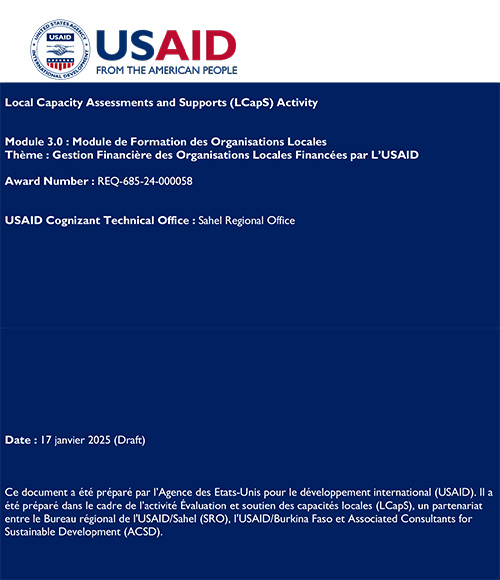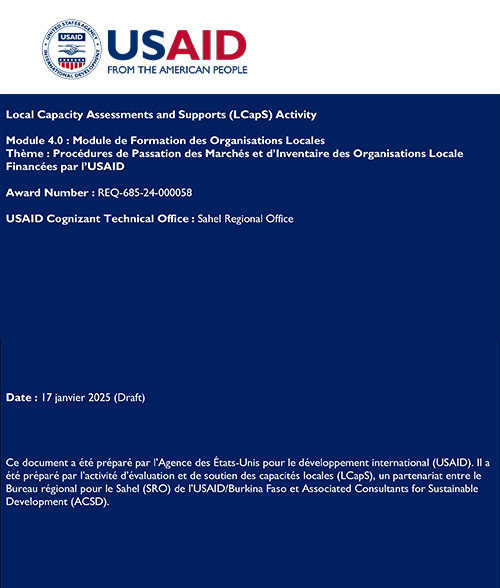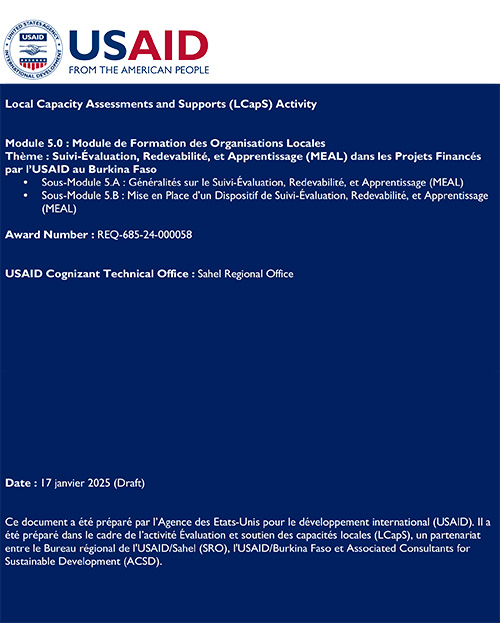Institutional and Local Capacity Strengthening Highlights
Numbers after publications link to locations in the Publications and Reports page
For a definition of all acronyms used on this page, click here
Capacity encompasses the knowledge, skills, and motivations as well as the relationships that enable an actor—an individual, an organization, or a network—to design and implement solutions to local development challenges, to learn and adapt from that challenge, and to innovate and transform over time.
Local capacity strengthening is a strategic and intentional investment in the process of partnering with local actors—individuals, organizations, and networks—to jointly improve the performance of a local system to produce locally valued and sustainable development outcomes.
Source: USAID. 2022. Local Capacity Strengthening Policy. Washington, DC: USAID, p. 2.
LCS of USG’s Current and Potential Partners (Burkina Faso): Since May 2024, I have collaborated with a local Burkinabe consulting firm—Associated Consultants for Sustainable Development (ACSD)—in the co-development of the Local Capacity Assessments and Supports (LCapS) Activity. When the LCapS Activity was conceived in May 2024, it was expected to provide a draft LCS strategy for USG assistance in Burkina Faso and to provide a model for how similar strategies could be co—developed with other countries in the Sahel. The Activity is being executed with the support of six Burkinabe consultants, one international consultant and 14 regional focal points that are based in the nine regional capitals where the Activity is working. During its first nine months, the Activity met and exceeded all of the USG’s expectations for its first and second phase which focused on 1) conducting an initial census of 642 past, current and potential US government partners (4) (Publication: 3.9.1); and 2) a more intensive organizational capacity assessment tool (OCAT) of 212 of the most viable partners (Publication: 3.9.2);
Based on this initial research, LCapS has developed five training modules that it intends to use to train at least one person from each of the 212 partners who were included in the OCAT (LCapS Phase III) (Publications: 3.9.3, 3.9.4, 3.9.5, 3.9.6) and to move forward with the preparation of a draft LCS strategy for the US government’s current and potential partners in Burkina Faso (LCapS Phase IV).
Local Governments and Women’s Groups: During the due diligence phase of Burkina Faso’s first MCC Compact, Millennium Challenge Account/Burkina Faso (MCA/BF), Mr. Issa Zerbo and I were tasked with building the capacity of the women’s groups, local mayors and district councils to collaborate on the design and execution of the MCA/BF projects in ways that respected and supported the national WID and resettlement policies of the country, as well as the more specific resettlement and WID guidelines of MCA/BF (Publications: 4.3, 4.4, 4.5, 4.6, 4.7, 4.8). Once the Compact was signed, Mr. Zerbo became the Director of Administration and Finance of the Tetra Tech Land Project (October 2009–August 2012) and the Administration and Financial Director of a USAID-funded food security program in Chad (January 2013–February 2015).
Local Non-Governmental Organizations (NGOs) and Organizations (Food for Peace [FFP] and Feed the Future [FtF] Programs): In conjunction with Africare’s Institutional Support Assistance (ISA) grant from USAID, I backstopped the agency’s efforts to develop and pilot-test four institutional assessment indicators: (1) the Months of Adequate Household Food Provisioned (MAHFP); (2) the Food Security Community Capacity Index (FSCCI); (3) the Food Security Program Capacity Index (FSPCI); and (4) the Food Security Food Distribution Index (FSFDI). Two of these assessment tools; the MAHFP and FSCCI—which were co-developed with Food and Nutrition Technical Assistance (FANTA) and staff from Cornell University’s Division of Nutritional Sciences—were later accepted as core indicators by FFP and FANTA. In 2007, I facilitated the development of an online series of technical papers (the Africare Food Security Review [AFSR] papers) that are posted on the DEC, which: (1) describe the basic guidance for these tools (Publications: 3.3.2.1, 3.3.2.2, 3.3.2.3, 3.3.2.17, 3.3.2.24); (2) compare the data gathered by these community-based self-assessment tools with other indicators being developed by FANTA and Cornell (Publications: 3.3.2.5, 3.3.2.10); and (3) illustrate how the MAHFP and FSCCI tools were used to build the capacity of local community councils in Uganda (Publications: 3.3.2.6). The same series shows how the same group of indicators were used to (4) monitor the local communities’ capacity to support various regional early warning and response systems (Publications: 3.3.2.15, 3.3.2.16) and (5) better target food aid to households living with HIV-AIDS (Publications: 3.3.2.11, 3.3.2.23).
I later collaborated with several partners (Catholic Relief Services [CRS], Africare, Cultivating New Frontiers in Agriculture [CNFA]) on using a modified version of the FSCCI self-assessment tool to measure the baseline capacity of the local NGOs and civil society organizations (e.g. producer and market groups, cooperatives, and federations) they were working with and what types of technical and management training would be needed to build this capacity; and to monitor the impact of their training programs and mentoring on this local capacity.
Institutional Capacity Strengthening Highlights
Local Consulting Firm (ACSD in Burkina Faso) (2019–present) : Since 2017, I have mentored Mr. Issa Zerbo in his initial conceptualization of his firm, Associated Consultants for Sustainable Development (ACSD). ACSD got its official government registration in 2018 and the other official registrations required by the United States Agency for International Development (USAID) in 2020. The firm is located in a secure location near l’Université Joseph Ki-Zerbo de Ouagadougou that includes space for consultant offices and small meetings and training courses. The firm has a growing roster of qualified consultants and research assistants that include many professors and students from Burkinabe Universities and is fully bilingual (English-French).
Universities and Research Institutes (UCC, KNUST, CSIR-SARI in Ghana) (2016–2024): Collaborated in the co-design and co-implementation of USG-funded initiatives within the USG’s mainstream portfolio for Ghana. A key aspect of these three USG-funded projects was the involvement of both the USDA and U.S. land-grant universities, which were tasked with strengthening the financial capacity of the three institutions to effectively manage and monitor donor-funded initiatives. Additionally, a disproportionately high percentage of USG funds, compared to other USG-funded programs worldwide, remained in Africa.
- Publications:
- Three approved evaluation reports and/or evaluations 2.18, 2.19
- METSS II Performance Monitoring and Management Plan (PMMP) 3.2.1
Catholic Relief Service (2004–2016): Long-term relationship (multiple contracts) with the NGO Catholic Relief Services that involved M&E staff training, the design and execution of mid-term evaluations for some of their USAID-funded projects, pilot-testing and initial scale up of various tools for tracking local partner capacity, and mentoring staff on publications.
- Publications:
- Program Assessments and Evaluations: 2.6, 2.7, 2.12
- Other Documents Produced for USAID and USAID-Funded Projects and Programs: 3.1.1.A, 3.1.2, 3.1.4, 3.7.2.4, 3.7.2.5
- Articles: 8.1
CSRL/ISU Program, the National NGO VEDCO, and Makerere University (2012–2015):
Co-developed a workshop designed to produce an edited volume that describes the evolution of this three partner initiative and their co-development of one of the largest, most successful examples of a university-based endowment to support this type of partnership for other US and non-US Universities and NGOs.
- Publication: 1.1
Co-design and execution of a series of workshops and mini-workshops designed to help the CSRL/ISU staff (in Uganda and the US) develop more appropriate monitoring and evaluation systems that track the CSRL/ISU activities and training programs
- Publication: 10.2
MCA/Burkina Faso (2009–2012): Collaborate with MCA/Burkina Faso WID and Social Manager in Assessing general and sector-specific needs for women in development and resettlement.
- Publications: 4.1- 4.9
NGO-Africare (1999–2012): Long-term relationship (multiple contracts) with the NGO Africare that focused on building the capacity of Africare to design, execute and monitor their Title II and non-Title II programs in Africa and to improve the quality of their reporting
- Publications:
- Program Assessments and Evaluations: 2.13, 2.15
- Other Documents Produced for USAID and USAID-Funded Projects and Programs: 3.2.2, 3.3, 3.7.1.1, 3.7.1.2, 3.7.1.3, 3.7.2.1, 3.7.2.2
Anthropology and Food Policy Program, Department of Anthropology, University of Kentucky (UK) (1986–1988): Co-developed with Billie DeWalt the Anthropology and Food Policy Program, which was designed to build the core institutional capacity of the department to train students for applied work in food policy research and employment. A capstone activity was the production of the edited book Anthropology and Food Policy.
- Publication: 1.5
Food in Africa Program, Center for African Studies, University of Florida (UF) (1981–1986): Co-developed with Art Hansen the Food in Africa Program which was designed to build the core capacity of the Center to facilitate cross-disciplinary instruction and research on food issues in Sub-Saharan Africa. A capstone activity was the production of the edited book Food in Africa.
- Publications:
- Books in Refereed Series: 1.6
- Other Documents Produced for USAID and USAID-Funded Projects and Programs: 3.8.1, 3.8.4, 3.8.5
- Other: 10.2
UCC, KNUST, CSIR-SARI in Ghana (2016–2024): Collaborated in the co-design and co-implementation of USG-funded initiatives within the USG’s mainstream portfolio for Ghana. A key aspect of these three USG-funded projects was the involvement of both the USDA and U.S. land-grant universities, which were tasked with strengthening the financial capacity of the three institutions to effectively manage and monitor donor-funded initiatives. Additionally, a disproportionately high percentage of USG funds, compared to other USG-funded programs worldwide, remained in Africa.
- Publications:
- Three approved evaluation reports and/or evaluations: 2.1, 2.18, 2.19
- METSS II Performance Monitoring and Management Plan (PMMP): 3.2.1
Institutional and Local Capacity Strengthening Assignments
| Activities | ACSD | UCC | CSIR-SARI | KNUST-BIRD | MCA/Burkina Faso (for WID) | Africare Food Security Unit | UK Anthropology and Food Policy | UF Food in Africa | Iowa State University CSRL | Catholic Relief Services |
| 2019–present | 2016–2023 | 2021–2022 | 2023–2024 | 2008–2011 | 1999–2012 | 1986–1988 | 1981–1986 | 2012–2015 | 2004–2016 | |
| Facilitated participatory needs assessments |
X |
X |
|
|
X |
X |
|
X |
|
|
| Facilitated annual reviews of capacity needs |
X |
X |
|
|
X |
X |
|
X |
|
|
| Facilitated external and internal speakers series |
|
|
|
|
|
|
X |
X |
|
|
| Co-facilitated conference organization in host institution |
|
|
|
|
X |
X |
|
X |
X |
|
| Facilitated staff preparation of conference presentations |
|
|
|
|
X |
X |
X |
X |
X |
|
| Facilitated faculty/student/practitioner seminars that led to publications |
|
|
|
|
X |
X |
X |
X |
X |
X |
| Facilitated internal/external evaluations/final reports |
|
X |
X |
X |
|
X |
|
X |
|
X |
| Facilitated student/practitioner advisement and career planning/language training |
|
|
|
|
|
X |
X |
X |
|
|
| Developed proposals for external and internal funding of capacity building activities |
X |
X |
|
|
|
X |
X |
X |
|
|
| Training to build M&E systems and reporting |
X |
X |
|
|
|
X |
|
|
X |
X |






